Job seekers are turning to new sources for guidance on the challenges of the job market, with platforms like TikTok emerging as unexpected but influential resources. With nearly 42,000 tech workers laid off in the first quarter of 2024 alone, many candidates are experiencing prolonged job searches and increased uncertainty.
To explore the state of job hunting and hiring, Wrike surveyed 1,005 active job seekers and 503 hiring decision makers to reveal how workflows and mental health impact both sides of the hiring process. We also scraped TikTok and LinkedIn to explore engagement with career-related content.
Key insights
- Over one in 10 job seekers have turned to TikTok for advice, and 41% say that advice has led to an interview.
- Over two in three (68%) job seekers consider it a red flag when interviewers don’t explain the management of internal workflows.
- 62% of job seekers say they have been ghosted after an interview.
- Nearly half (48%) of hiring decision makers say that hiring in a competitive job market has increased their stress and anxiety.
- Hiring decision makers are 51% more likely to trust interview preparation content on LinkedIn than on TikTok.
- Interview preparation content on TikTok earns 64% more likes than salary negotiation content.
Job seeking in the social media era
Half of all job seekers surveyed have been searching for over six months, and the top reasons for looking are the desire for higher pay (29%), better work-life balance (29%), and recovery from a layoff (23%). As social media’s role in job seeking grows, TikTok has become a surprising leader in career advice for many job seekers, especially among younger generations.
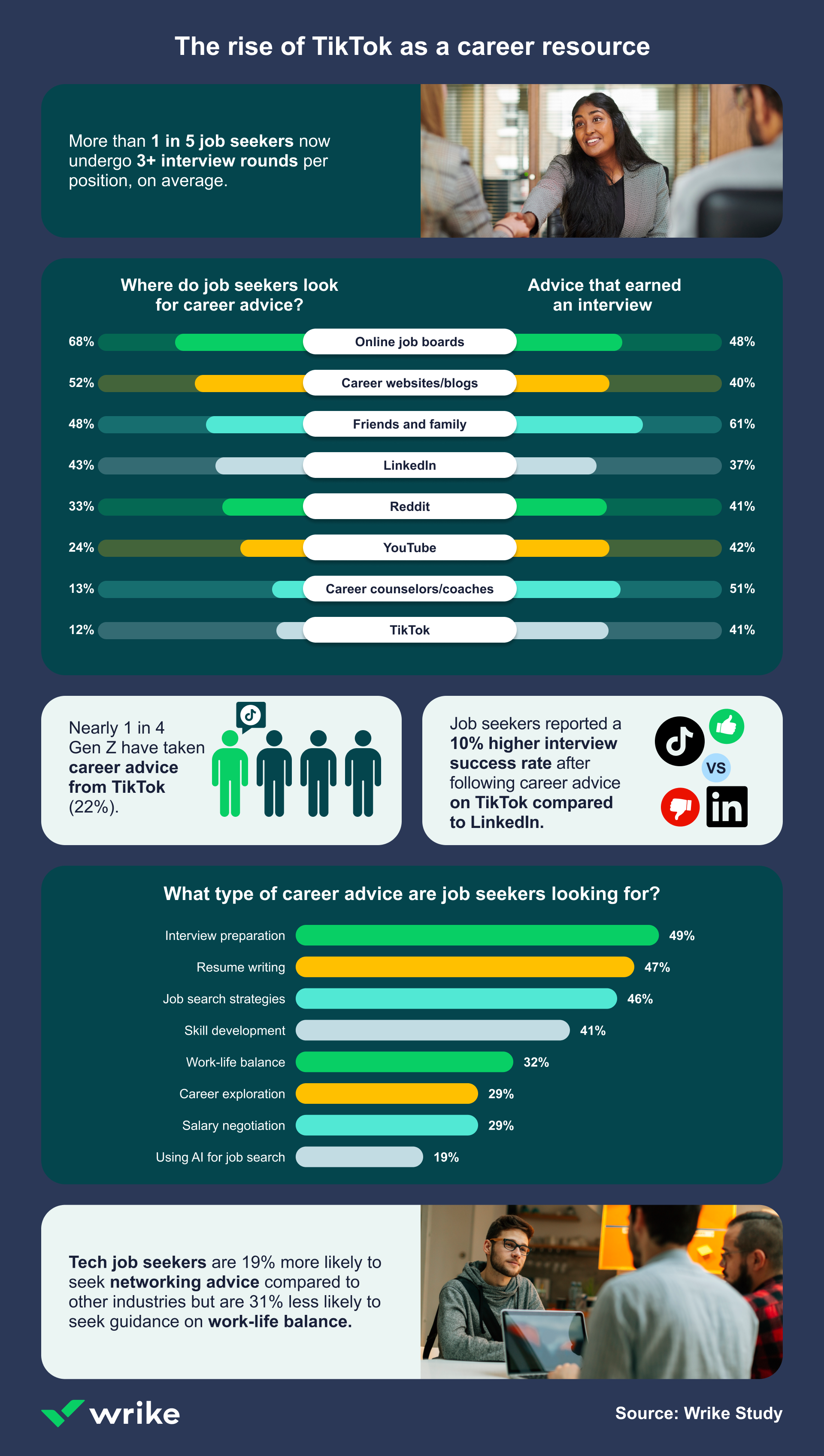
Younger generations are shifting away from traditional advice sources for the more informal, peer-driven insights on TikTok. For Gen Z especially, TikTok’s short-form videos and interactive advice are accessible and tailored to specific job market challenges.
Within the tech sector, employees are primarily interested in career advice on job search strategies (51%), interview preparation (50%), and resume writing (50%). Interestingly, job seekers report a 10% higher interview success rate when following advice from TikTok than from LinkedIn.
However, the data also underscores the need for reliable, structured support, as more than one in 10 sought a new job due to disorganized work processes. Project management tools and templates can provide consistency and collaboration to balance these unstructured influences.
How interview practices impact candidate wellbeing
According to our research, the interview process is taking a toll on job seekers’ mental health, and a lack of transparency from hiring teams is a significant contributor.
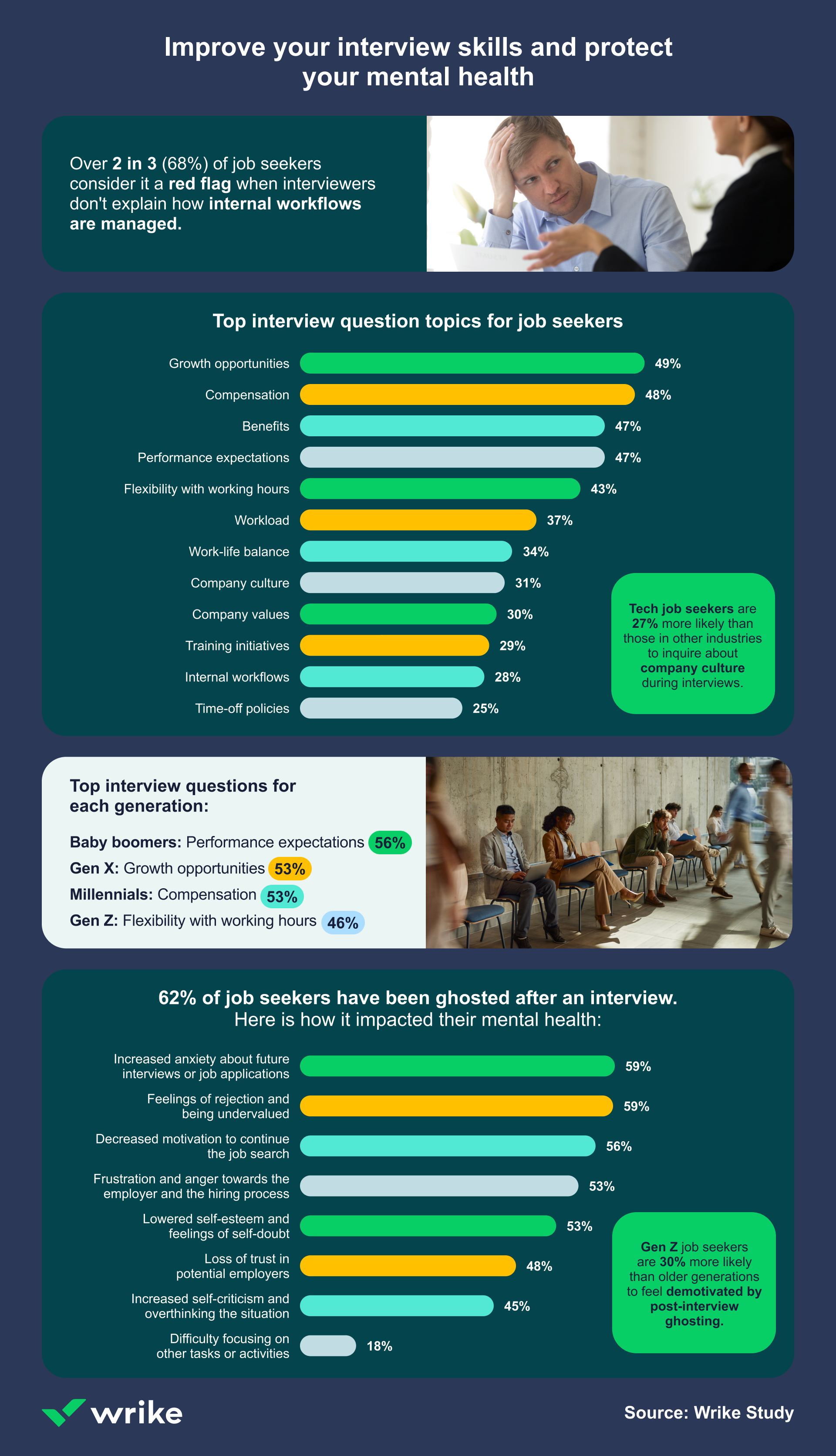
Transparency and trust
Finding the right fit is as much about the candidate as the hiring team. We found that 68% of job seekers consider it a red flag when interviewers fail to explain internal workflows — a sign that transparency in operations matters for applicants.
At the same time, 62% of candidates reported they had experienced ghosting after interviews. This experience impacted their mental health and confidence moving forward.
This emphasis on transparency and trust highlights the importance of clear, organized workflows within hiring teams, which can also impact retention and morale. Wrike’s solutions provide hiring managers with tools to establish openness and consistency in processes, fostering a supportive hiring experience that respects candidates’ time and effort.
Topics discussed in interviews
Respondents to the survey also highlighted vital topics they were most likely to inquire about during interviews, with some noticeable differences across genders and generations.
For example, Gen Z candidates prioritizing personal wellbeing are 16% more likely than older generations to ask about work-life balance. In contrast, baby boomers were 22% less likely to focus on performance expectations, possibly assuming these details will emerge later in the onboarding process.
Gender also plays a role in candidate inquiries, as women are most likely to ask about growth opportunities (51%) and performance expectations (48%). Meanwhile, men are most likely to ask about benefits (52%) and compensation (52%). Women are 28% more likely than men to ask about training initiatives in interviews, reflecting a focus on long-term development.
These varied interests underline the need for hiring teams to prepare to address a range of inquiries and use business process management tools to provide a comprehensive, inclusive interview experience.
Challenges facing today’s hiring managers
The hiring market’s pressures aren’t only felt by job seekers — hiring managers are experiencing increased stress, with 48% reporting heightened anxiety due to competitive hiring demands.
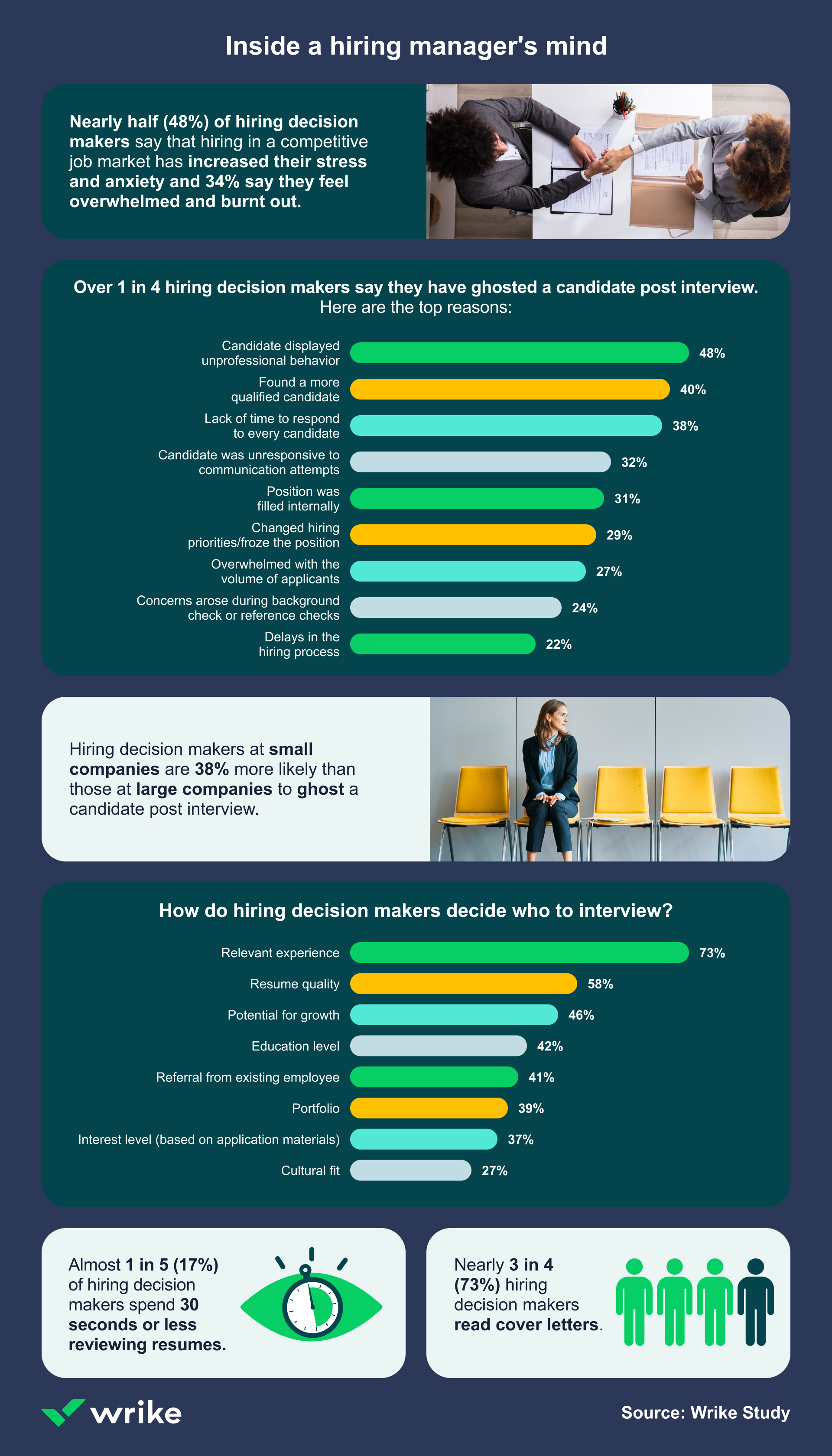
A look inside the hiring process
Hiring decision makers prioritize efficiency in their selection process, with one in five spending 30 seconds or less on resume reviews and 73% reading cover letters to assess candidates quickly. 73% of those surveyed say relevant experience is the #1 key factor in deciding who to interview.
However, over one in four hiring managers have ghosted candidates post-interview, often due to the candidate displaying unprofessional behavior (48%) or due to finding a better-qualified applicant (40%). This reflects the pressures hiring teams face in balancing thoroughness with time constraints in a competitive market, where task management solutions can be essential for keeping processes organized and timely.
To streamline your recruitment process from candidate sourcing to onboarding and beyond, you need a work management platform that keeps everything in one place. Wrike’s template for onboarding and offboarding is the ideal solution.
Key insights for job seekers
Understanding what matters to hiring managers can give candidates an edge in a competitive job market.
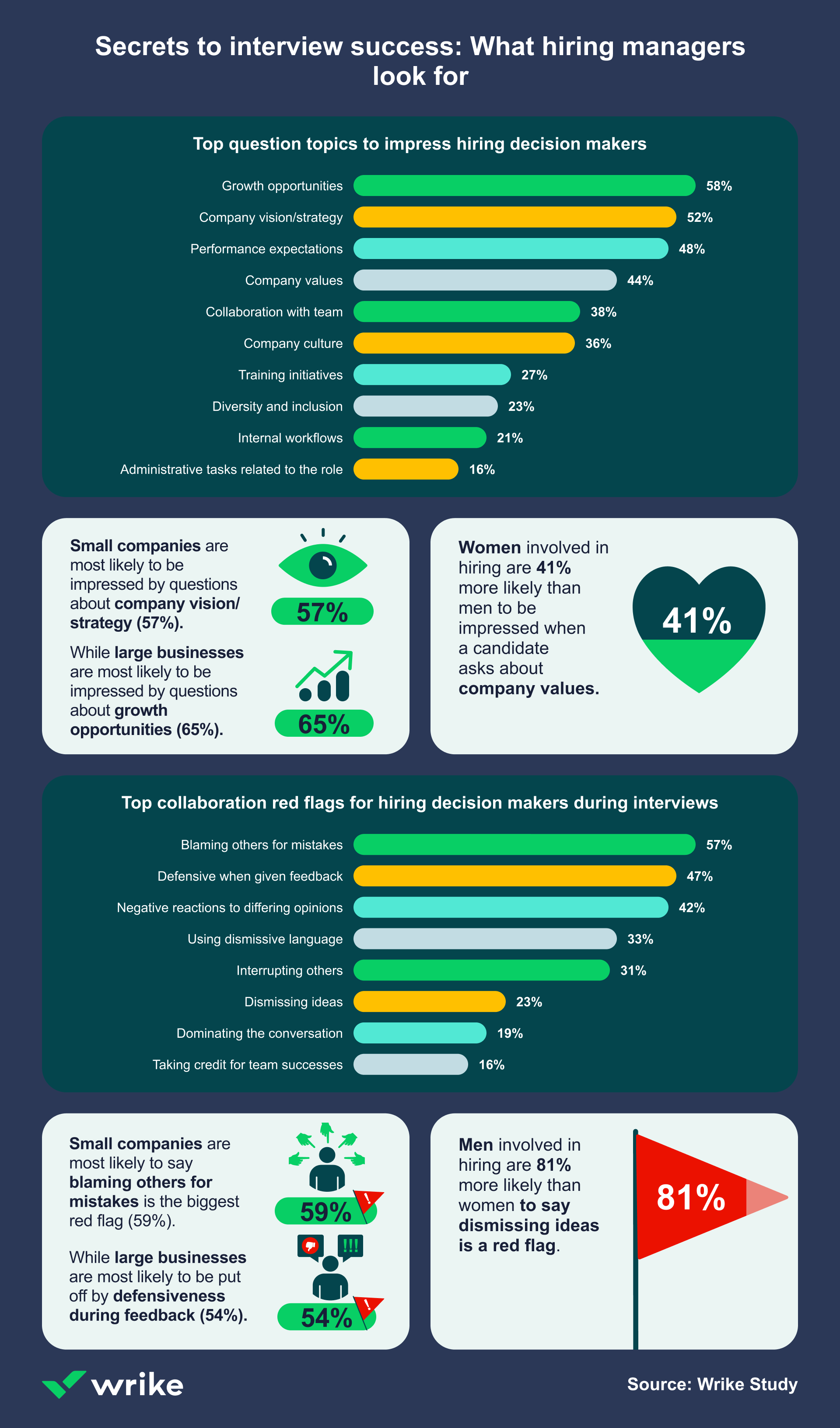
For instance, small companies are most impressed by questions about company vision and strategy (57%). Conversely, larger organizations prioritize inquiries around growth opportunities (65%).
Interestingly, while only one in three tech hiring decision makers would be impressed by questions related to team collaboration, 41% of female hiring managers appreciate questions about company values — showing the value placed on cultural fit.
The data also points to potential red flags. Smaller companies are most concerned with candidates who blame others for mistakes (59%), while larger organizations are primarily put off by defensiveness during feedback (54%).
These insights suggest that candidates can make a positive impression by asking thoughtful, strategic questions and steering clear of behaviors that signal poor teamwork skills. For hiring teams, task management software can aid in maintaining transparency throughout the recruitment process, helping set clear expectations for prospective employees and facilitating a smoother hiring experience.
Trust in career advice across TikTok and LinkedIn
Hiring decision makers are selective about where they trust career advice, with platforms like LinkedIn and TikTok serving distinct purposes.
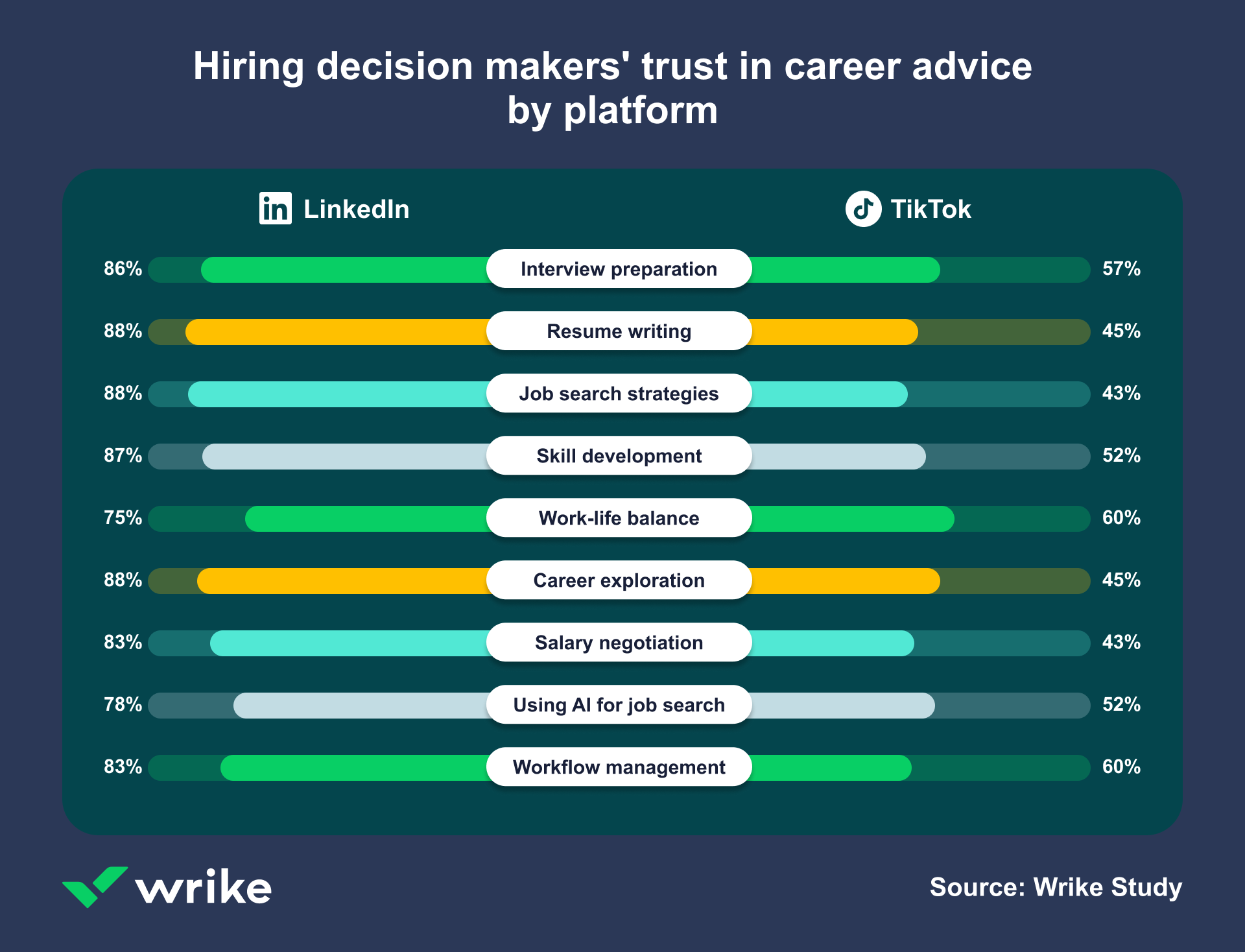
The data highlights that LinkedIn is the go-to platform for trusted advice, with 88% of hiring managers relying on it for content on resume writing, job search strategies, and career exploration. They also trust LinkedIn 51% more than TikTok for interview preparation content and 77% more for workflow management topics.
Meanwhile, TikTok’s advice is most trusted on work-life balance (60%), interview preparation (57%), and career exploration (56%), resonating with job seekers through engaging, practical content that often receives high engagement.
This data underscores a clear divide: While TikTok captivates job seekers with practical advice, LinkedIn remains the trusted source among hiring professionals. Wrike’s tools can help bridge these platform-based and generational gaps, offering structured resources that align teams on hiring objectives and enhancing platform transparency.
Engagement of career advice by platform
While LinkedIn is a more trusted source for hiring decision makers, TikTok boasts significantly higher engagement levels, and its content is more likely to lead to interviews.
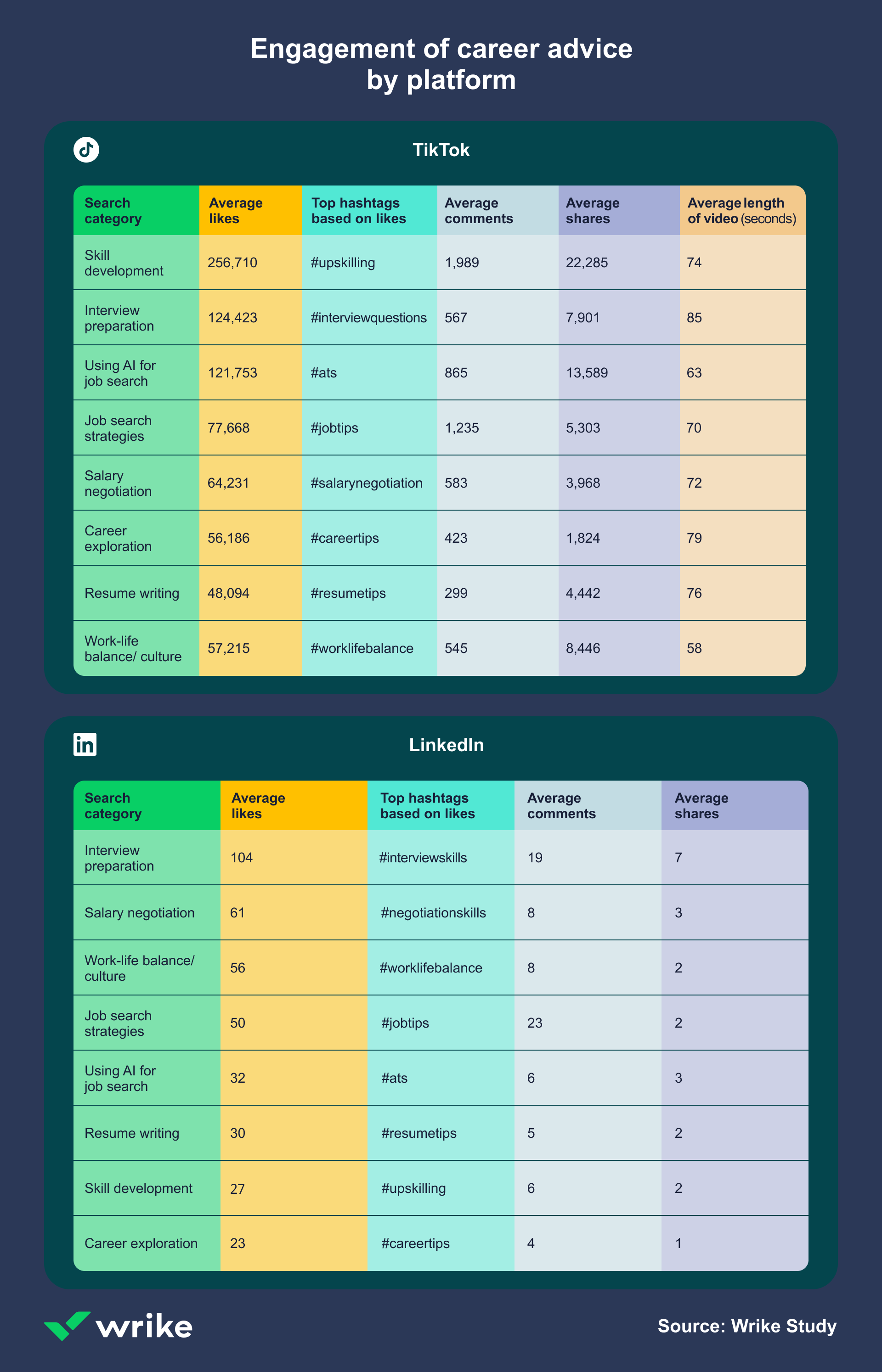
Engagement trends also vary by topic. On TikTok, skill development posts receive the highest engagement, with popular hashtags like #upskilling attracting thousands of likes and shares, while LinkedIn sees better performance on interview preparation posts, which earn 52% more likes than salary negotiation content.
Job seekers are engaging with different career topics across platforms, suggesting that TikTok’s format is well suited for practical, quick tips. At the same time, LinkedIn remains the trusted platform for more formal job-related guidance.
Collaborative platforms can empower HR teams to respond to these shifts, enhancing the way they engage with candidates and align on shared goals. With Wrike’s templates and organizational tools, hiring managers can create a structured process that incorporates both trusted advice and popular trends.
Navigating the modern hiring landscape
As we’ve discussed, job seekers are increasingly turning to social media platforms like TikTok for quick, accessible career advice. TikTok’s content on work-life balance, interview preparation, and career exploration resonates particularly well, with high engagement rates among younger job seekers who value practical, real-world insights.
In contrast, LinkedIn remains a more trusted choice for hiring decision makers. This divide reflects a shift in how candidates approach job searches, seeking a blend of trusted guidance and peer-driven tips across both platforms.
For hiring teams navigating this shift, insights from our study reveal the importance of adapting to these trends to remain competitive and maintain trust throughout the hiring process.
To aid both job seekers and hiring teams who are feeling the pressure, Wrike’s tools offer crucial support in making hiring and onboarding more effective. From workflow software that speeds up processes to collaboration tools that boost visibility, Wrike enhances hiring processes to support all stakeholders.
For today’s HR teams, Wrike is more than just workflow software — it’s a trusted partner in navigating the modern job market.
Methodology
We surveyed 1,005 active job seekers and 503 hiring decision makers to explore the current job market. We also scraped TikTok and LinkedIn to explore engagement with career-related content. We explored over 90 hashtags to analyze over 3,500 TikToks and over 8,000 LinkedIn posts in 2024.
Fair use statement
We welcome you to share our findings but request that you link back to this page.






